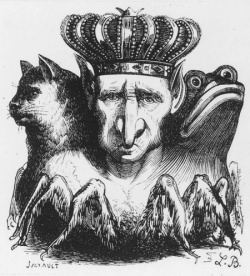Baal
(Difference between revisions)
|
Revision as of 12:09, 18 Nov 2005 Thiebes (Talk | contribs) added template |
Revision as of 12:12, 18 Nov 2005 Thiebes (Talk | contribs) fixed typo |
||
| Line 18: | Line 18: | ||
| ==References== | ==References== | ||
| - | *Wikipedia (2005). ''[http://en.wikipedia.org/wiki/Baal_(demon) Baal].'' Retrieved Nov 18, 205 | + | *Wikipedia (2005). ''[http://en.wikipedia.org/wiki/Baal_(demon) Baal].'' Retrieved Nov 18, 2005 |
Revision as of 12:12, 18 Nov 2005
Baal is a Christian demon. His name also refers to various gods and goddesses who are not demons. This is a potential source of confusion. In this article the name Baal is used only to refer to the demon Baal, unless stated otherwise.
Other spellings: Bael, Baël (French), Baell.
The idea of Baal as a demon was created when Christianity turned ancient gods into demons and demonology divided the demonic population of Hell in several hierarchies. Baal, the Semitic god, did not escape, becoming a separate entity from Beelzebub.
According to demonology, Baal (usually spelt "Bael" in this context; there is a possibility that the two figures aren't connected) was ranked as the first and principal king in Hell, ruling over the East. According to some authors Baal is a Duke, with sixty-six legions of demons under his command.
During the English Puritan period Baal was either compared to Satan or considered his main assistant. According to Francis Barrett he has the power to make those who invoke him invisible, and to some other demonologists his power is stronger in October. According to some sources, he can make people wise, and speaks hoarsely.
While his Semitic predecessor was depicted as a human or a bull, the demon Baal was in grimoire tradition said to appear in the forms of a man, cat, toad, or combinations thereof. An illustration in Collin de Plancy's 1818 book Dictionnaire Infernal rather curiously placed the heads of the three creatures onto a set of spider legs.
See also
| Goetic Demons
|
|---|
|
References
- Wikipedia (2005). Baal (http://en.wikipedia.org/wiki/Baal_(demon)). Retrieved Nov 18, 2005
![[Main Page]](http://www.thelemapedia.org/images/logo.gif)
